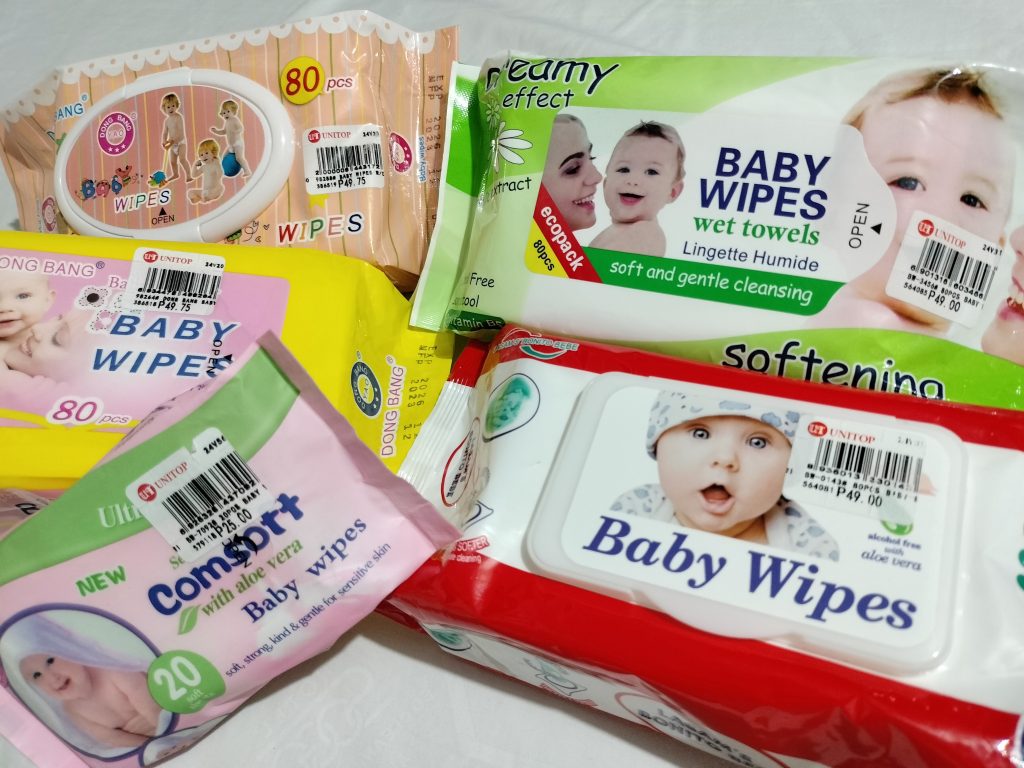QUEZON CITY — The toxics watchdog group EcoWaste Coalition has again raised the red flag over the persistent sale of imported baby wipes containing allergy-causing preservatives banned many years ago by the Food and Drug Administration (FDA) to protect human health.
The group repeated its warning after buying five unauthorized baby wipe products listing methylchloroisothiazolinone (MCI; also referred to as MCIT or CMIT), methylisothiazolinone (MIT or MI), and isobutylparaben as ingredients at the branch of a popular chain store in Calapan City, Mindoro Oriental.
MCI and MIT are known to cause skin redness, itching, and blistering, and have been prohibited since 2018 in leave-on cosmetic products, including baby wipes, as per FDA Circular No. 2017-006 and FDA Advisory No. 2018-034.
Isobutylparaben, a known endocrine-disrupting chemical (EDC), has been banned in cosmetics since 2016 along with four other parabens, namely benzylparaben, isopropylparaben, pentylparaben, and phenylparaben, according to FDA Advisory No. 2016-032.
In test buys conducted on May 25, the EcoWaste Coalition purchased four products containing MCI/MIT (two variants of Dong Bang Baby Wipes, Lasam’s Bonito Bebe Baby Wipes, and Baby Wipes Wet Towels) and one product with isobutylparaben (Sensitive Comsoft Baby with Aloe Vera Wipes).
Sensitive Comsoft Baby with Aloe Vera Wipes also contains butylparaben and propylparaben, which are permitted in cosmetics except for leave-on products designed for application on nappy areas of children under three years old.
The products, mostly marked “made in China,” are sold for P25 to P49.75 per pack and are not old stocks. Baby Wipes Wet Towels was manufactured in 2024 and will expire in 2027, while the other four were produced in 2023 and will expire in 2026, indicating that the products were recently imported.
Wipes containing MCI/MIT can cause contact dermatitis, “a skin disorder characterized by redness, itching, and vesiculation (that) results from contact with environmental substances that elicit an allergic and/or irritant response,” according to the World Health Organization (WHO).
MCI/MIT, which are commonly used as a mixture in products, are prohibited in leave-on cosmetic products, including wet wipes, under the ASEAN Cosmetic Directive (ACD) and the European Cosmetic Products Regulation. Isobutylparaben and the other four parabens mentioned earlier are likewise classified as banned cosmetic ingredients in the two regional blocs.
To prevent children’s exposure to known skin sensitizers, as well as EDCs, the EcoWaste Coalition reminded parents to heed these tips:
- Use lukewarm water, mild soap, and cotton balls for cleaning the baby’s bottom, and only use wet wipes when water is not available.
- Read the product label carefully and shun those that include MCI/MIT and banned parabens as ingredients.
- Reject products that do not list their ingredients and do not have an expiry date.
- Look for alcohol-free and unscented wet wipes.
- To cut the chances of an allergy, refrain from using unauthorized wet wipes for cleaning baby’s hands, mouth, and other body parts.
- After using wet wipes, rinse with water to get rid of chemical residues and reduce the risk of skin allergies.
The waste and pollution watchdog group also reminded consumers to properly dispose of used wipes to prevent blocking the drains, contaminating recyclables, and aggravating ocean pollution.
Finally, the group appealed to manufacturers, importers, distributors, and retailers as part of their corporate social responsibility, to ensure that wet wipes and other cosmetic products containing banned ingredients are not produced and offered for sale to the general public.

